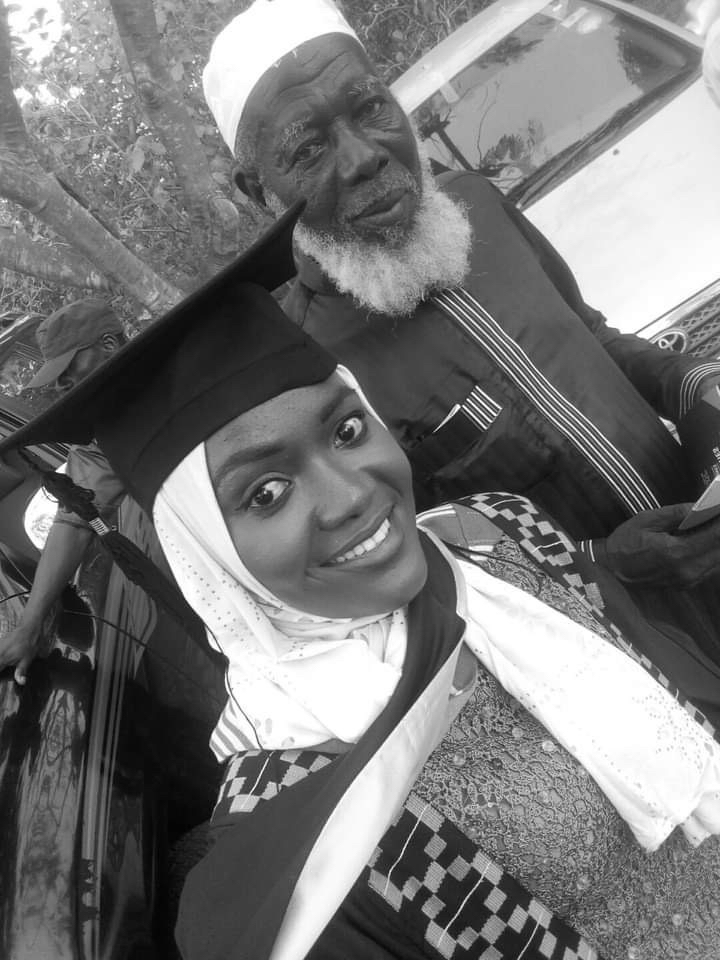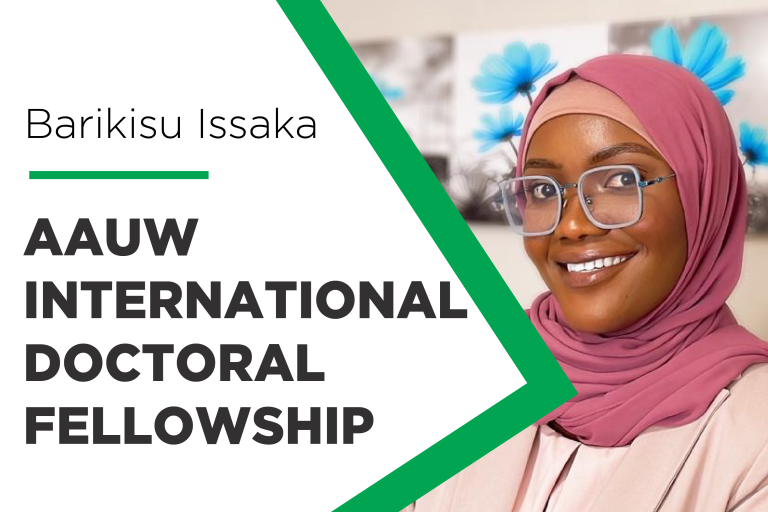Barikisu Issaka receives prestigious award from AAUW
A second-year doctoral student in the interdepartmental Information and Media Ph.D. program at Michigan State University has received a prestigious international doctoral fellowship from the AAUW—one of the world’s largest sources of funding for graduate women.
Barikisu Issaka was awarded $20,000 for the year 2022-23 to support her research into illuminating understanding of the relationship between social media activities during PPD and a new mother’s awareness of PPD symptoms. Issaka will particularly focus on how new young mothers from diverse racial and ethnic backgrounds navigate cultural barriers in seeking PPD-related help through social media and from health professionals. Her hopes are that the results of her study will be applied toward devising health communication strategies for international organizations that serve women, especially those in historically marginalized communities who are experiencing post-partum depression.
Recipients of the prestigious AAUW doctoral fellowship return to their home countries to become leaders in business, government, academic, community activism, the arts or scientific fields. The prestigious award is bestowed to exceptional researchers, students, and professionals whose innovative projects are geared toward empowering women and girls across different parts of the world. Barikisu’s research aligns with the award’s intent by supporting maternal health in her home country of Ghana and beyond.
“I was so happy and honored to receive the AAUW fellowship,” said Barikisu. “Many past recipients have gone on to be influential leaders in their fields. It tells me I am on a great path to achieve my goals and make a difference that will make a real positive difference in people’s lives.”
 Defining direction
Defining direction
Barikisu grew up in Ghana, the fourth of eight children. She attended St. Mary’s Senior High School, an all-girls school, and earned her bachelor’s in Information Studies and Psychology from the University of Ghana. She came to the U.S. for her master’s degree at Kansas State University and started her doctoral studies and research in social media and health communication at MSU in 2021.
More specifically, Barikisu studies how health organizations leverage social media to promote preventive health behaviors in minoritized communities. Her interests include conducting comparative research related to health communication and social media by comparing Western countries like the United States to African countries like Ghana and Kenya. She also examines how the representation of Muslim women in mainstream media shapes their identities and activism.
Barikisu’s primary goal has always been to improve the health of women in various communities through education and comparative research. Her parents were a constant source of encouragement, connecting her with people and programs that put her on the higher education track. She was also deeply inspired by her volunteer work as a teen and new graduate with Zurak Cancer Foundation in Ghana.
“Even though I was educated, I knew nothing about breast cancer,” she said. “I realized I didn’t know much because there was a lack of communication and information available.”
Barikisu set out to change the paradigm by promoting health communication through readily available technologies and social media.
“By normalizing issues, particularly those related to mental and maternal health, people can become more educated about preventive health behaviors,” she said. “Health communication technologies and social media can provide a way for people to talk more, express concerns, and get answers.”
As a doctoral student, Barikisu has been an ongoing member of collective research teams focused on the relationship between social media use and health-related risks. She has also participated in studies focused on the effects of social issue advocacy and racial categorization of social media influencers.
Associate Professor of Advertising and Public Relations Saleem Alhabash leads several student research teams in the College of Communication Arts and Sciences. He said Barikisu approaches her work with an attitude of responsibility—not only toward her own personal achievement and progress—but toward serving the communities she belongs to.
“Barikisu has been clear from day one about her research agenda,” said Alhabash. “What I find inspiring is her dedication and determination to fulfill a strong and impactful research program. She is highly productive, winning multiple research awards, getting papers accepted to competitive international conferences, and papers submitted to journals—all in her first year in our doctoral program.”
Finding fellowship
Looking ahead, IBarikisu aspires to work in a research institution or university and to contribute to the knowledge, research and strategies within the field of health communication and new media.
Barikisu said Alhabash, her adviser and Associate Professor of Advertising, Anastasia Kononova, and her fellow Ph.D. students provide the support and community she values as an international student. Kononova, she said, helped her reflect on the type of teacher she wanted to be. Alhabash helped her develop her research abilities. Her fellow Ph.D. students and alumni are her role models, providing a continual source of inspiration for what she can achieve.
“I find it encouraging when I hear people say I am a source of inspiration, too,” she said. “Receiving this fellowship isn’t just for me. It’s for every other young Muslim girl out there, a way I can let them know they can achieve whatever they want if they set their mind to it.”
By Ann Kammerer
